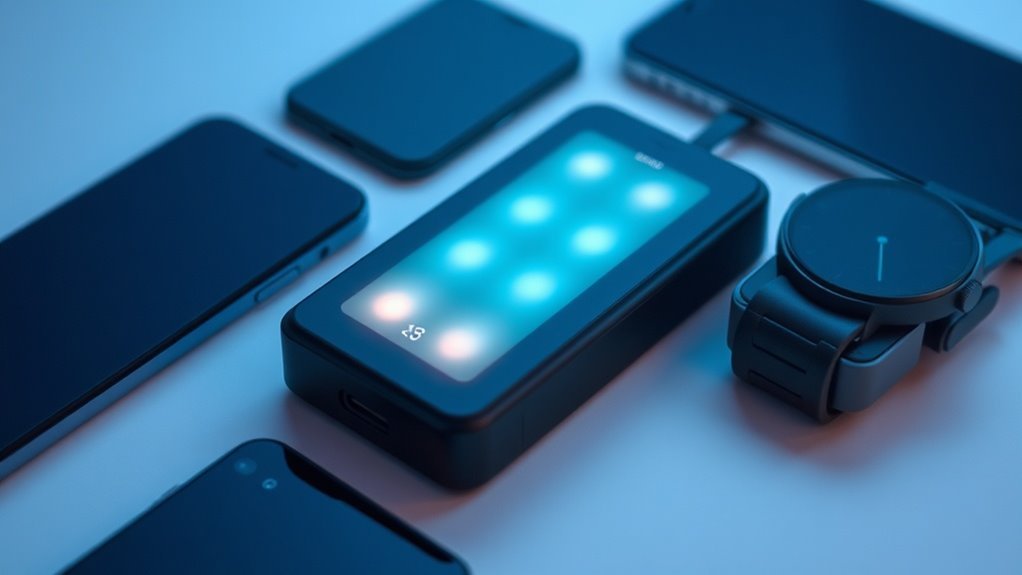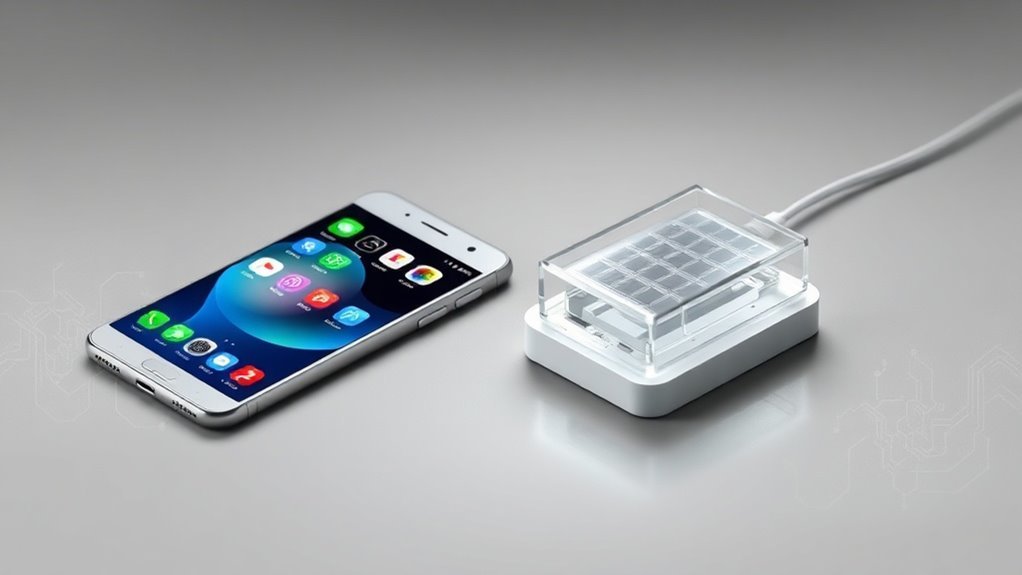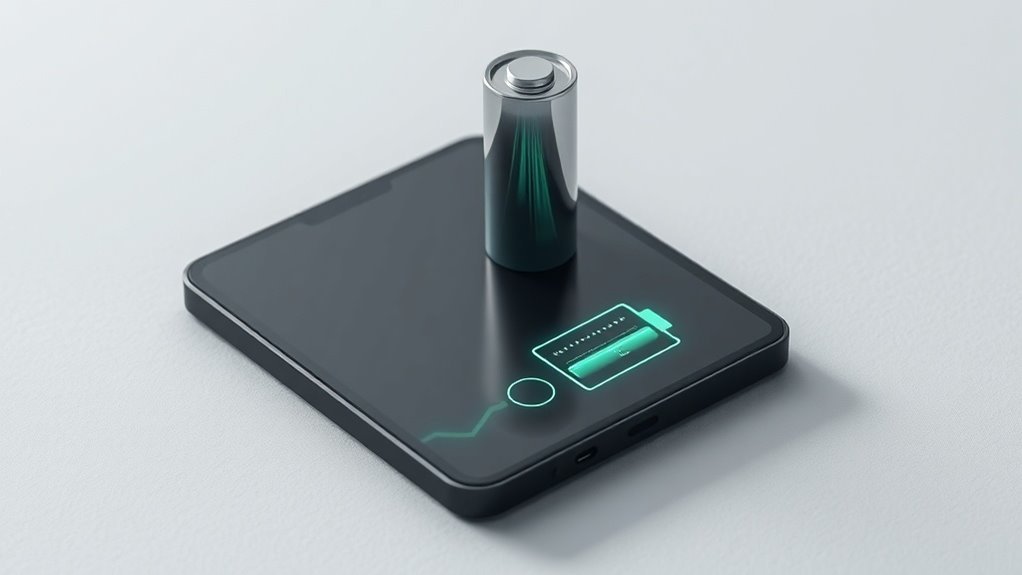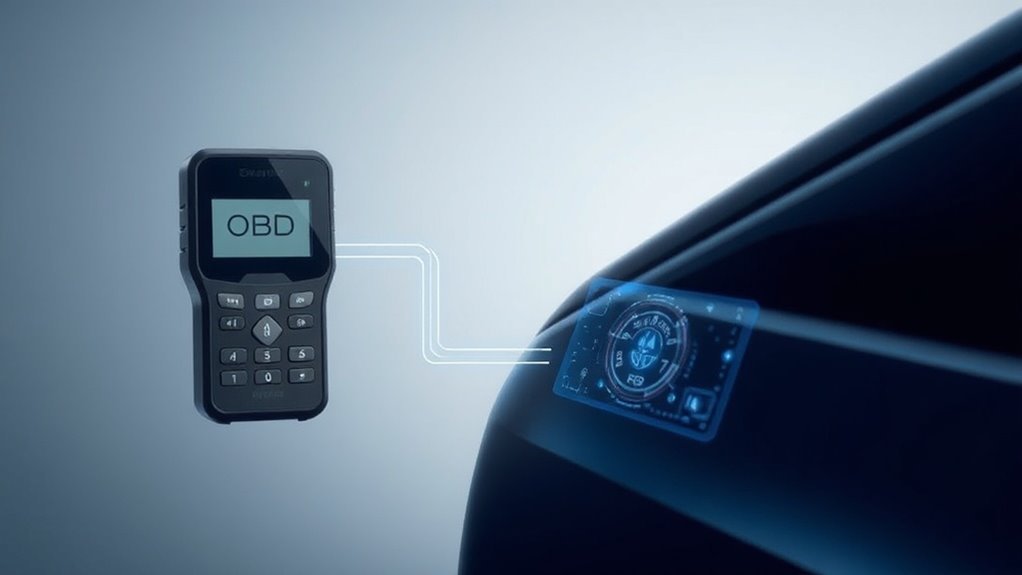Rechargeable Battery Technology in Smart Devices

Rechargeable battery technology is essential for modern smart devices, enhancing their efficiency and performance. Lithium-ion batteries lead the way with their high energy density, long cycle life, and fast charging capabilities. You’ll find these advancements allow for sleeker designs and longer-lasting devices. Emerging alternatives like solid-state and lithium-sulfur batteries promise even better efficiency and sustainability in the future. To discover more about the innovations shaping this field, keep exploring the latest trends and developments.
Key Takeaways
- Lithium-ion batteries dominate the market, offering high energy density and lightweight design for efficient smart device functionality.
- Enhanced charging capabilities of modern batteries allow for faster power replenishment, minimizing downtime for users.
- Solid-state and lithium-sulfur batteries are emerging as promising alternatives, providing increased safety and energy density.
- Sustainable battery production practices are crucial for reducing environmental impact and ensuring eco-friendliness in device manufacturing.
- Technological advancements in battery management systems improve longevity and safety, enhancing overall user experience in smart devices.
Evolution of Rechargeable Battery Technology
Since the early days of electric power, rechargeable battery technology has evolved considerably, paving the way for the devices we rely on today. You may not realize it, but rechargeable batteries have come a long way since their inception.
Early models like nickel-cadmium (NiCd) were heavy and had limited capacities. As you look around, you’ll find lithium-ion batteries dominating the market, thanks to their lightweight design and higher energy density.
These advancements focus not just on power but also on safety and longevity; for instance, improved management systems help prevent overheating and extend battery life.
As technology continues to innovate, expect even more efficient solutions, ensuring your smartphones, laptops, and other devices keep running smoothly.
Benefits of Lithium-Ion Batteries

When it comes to rechargeable batteries, lithium-ion stands out for a few key reasons.
You’ll appreciate its high energy density, which means more power without adding extra weight.
Plus, with long cycle life and fast charging capability, it makes life a lot easier for your devices.
High Energy Density
As the demand for portable power continues to rise, high energy density stands out as one of the key benefits of lithium-ion batteries. You’ll appreciate this quality because it allows devices to run longer without frequent recharges.
Here are some advantages of high energy density:
- Compact Size: Smaller batteries mean sleeker devices that are easier to carry.
- Extended Usage: Enjoy longer device life during activities like travel or work without worrying about battery drain.
- Enhanced Performance: Power-hungry applications can run smoothly without compromising battery life.
- Lightweight Design: Reduces overall weight, making it convenient for mobile gadgets.
These features make lithium-ion batteries an excellent choice for modern smart devices, balancing performance and portability.
Long Cycle Life
One of the standout features of lithium-ion batteries is their impressive long cycle life, which means you can rely on them for numerous charge and discharge cycles without significant degradation in performance.
This longevity translates to fewer replacements over time, saving you money and reducing electronic waste. Since you won’t need to swap batteries as frequently, your devices can maintain consistent performance and reliability.
Additionally, the long cycle life enhances convenience, allowing you to use your gadgets hassle-free for extended periods. You’ll experience less downtime, and that’s a significant benefit, especially when you rely on your smart devices daily.
Fast Charging Capability
The ability to quickly recharge your devices is a game changer, especially in today’s fast-paced world.
Fast charging technology in lithium-ion batteries means you can power up smartphones and laptops in no time. Here are some benefits of this capability:
- Increased Productivity: You can get back to work or play without long interruptions.
- Convenience: A brief charging session can give you enough battery life to last the day.
- Efficiency: Fast charging minimizes downtime, making your devices more reliable.
- Travel-Friendly: You can quickly charge on-the-go, eliminating the worry of running out of power.
Embracing fast charging guarantees you’re always connected when it matters most.
Emerging Alternatives: Solid-State and Lithium-Sulfur

While conventional lithium-ion batteries have dominated the market, emerging alternatives like solid-state and lithium-sulfur technologies are paving the way for more efficient energy storage solutions.
Solid-state batteries offer enhanced safety and energy density by using a solid electrolyte instead of liquid, reducing the risk of leaks and fires. You’ll appreciate how these batteries can potentially provide longer lifespans and faster charging times.
On the other hand, lithium-sulfur batteries promise even greater energy density, which could translate into smaller, lighter batteries for your smart devices. They use sulfur as the cathode material, which is abundant and cost-effective.
As these technologies continue to advance, you might find your devices becoming more powerful and longer-lasting than ever before.
Impact on Smart Device Performance
As smart devices become integral to our daily lives, their performance increasingly depends on advancements in battery technology. Improved batteries not only enhance usability but also extend device life and functionality.
The performance of smart devices hinges on battery technology advancements, enhancing usability and extending their life and functionality.
Here are some key impacts on performance:
- Battery Life: Longer-lasting batteries mean fewer interruptions, allowing you to use your devices for extended periods without recharging.
- Charging Speed: Faster charging capabilities let you spend less time tethered to an outlet and more time enjoying your device.
- Energy Density: Higher energy density allows for slimmer devices without sacrificing power, giving you portable technology that fits your lifestyle.
- Heat Management: Efficient batteries reduce overheating, ensuring your device runs smoothly during demanding tasks.
These enhancements are crucial for a seamless user experience.
Sustainability and Environmental Considerations
Considering the environmental impact of battery production and disposal, it’s vital to prioritize sustainability in rechargeable battery technology.
You should be aware that traditional battery manufacturing processes can lead to significant ecological footprints, utilizing harmful materials that pollute the earth. Embracing eco-friendly alternatives, such as organic materials and efficient recycling methods, can mitigate these effects.
When choosing batteries for your smart devices, look for options designed for longevity and recyclability. Supporting companies that prioritize sustainable practices not only helps the environment but can also lead to innovations that reduce reliance on non-renewable resources.
Future Innovations in Battery Technology
How might future innovations in battery technology reshape our everyday lives? You’re about to experience significant changes that enhance convenience and sustainability.
Here are four exciting possibilities:
- Ultra-Fast Charging: Imagine charging your device in minutes, keeping you connected without long waits.
- Longer-Lasting Batteries: Batteries that last weeks, not days, could transform how you use your devices, freeing you from constant recharging.
- Flexible Batteries: This innovation allows batteries to be integrated into clothing or surfaces, creating new applications in wearables and smart furniture.
- Eco-Friendly Solutions: New materials and recycling methods can minimize waste, making battery production and disposal more sustainable.
These advancements promise to improve efficiency, convenience, and environmental impact, revolutionizing your interaction with technology.
Questions
How Long Do Rechargeable Batteries Typically Last Before Needing Replacement?
Typically, rechargeable batteries last anywhere from 2 to 10 years, depending on usage and care. You should monitor their performance and replace them when you notice significant declines in capacity or efficiency.
Can Rechargeable Batteries Be Recycled, and How?
Yes, rechargeable batteries can be recycled! You should take them to a designated recycling center or drop-off location. Many retailers also offer battery recycling programs, making it easy for you to guarantee they’re disposed of properly.
What Are the Risks of Overcharging Rechargeable Batteries?
Overcharging batteries can lead to overheating, reduced lifespan, and even explosion—like a volcano ready to erupt. You’ve gotta monitor them closely, or you could end up with more problems than you bargained for!
Do Rechargeable Batteries Degrade Faster in Extreme Temperatures?
Yes, rechargeable batteries do degrade faster in extreme temperatures. They can’t handle the heat or cold well, leading to decreased capacity and performance. So, it’s best to store and use them in moderate conditions.
Are There Safety Concerns With Lithium-Ion Batteries in Smart Devices?
Yes, there are safety concerns with lithium-ion batteries. They can overheat, swell, or even catch fire if damaged or improperly handled. It’s essential to monitor your device and follow manufacturer guidelines for safe usage.
Conclusion
In summary, rechargeable battery technology has come a long way, greatly enhancing the performance of smart devices. Did you know that lithium-ion batteries now power over 3 billion devices worldwide? This statistic highlights their vital role in our daily lives. As we look to the future, innovations like solid-state batteries could further improve efficiency and sustainability, pushing boundaries in device capability while addressing environmental concerns. Staying informed about these advancements can help you make better choices in tech.






